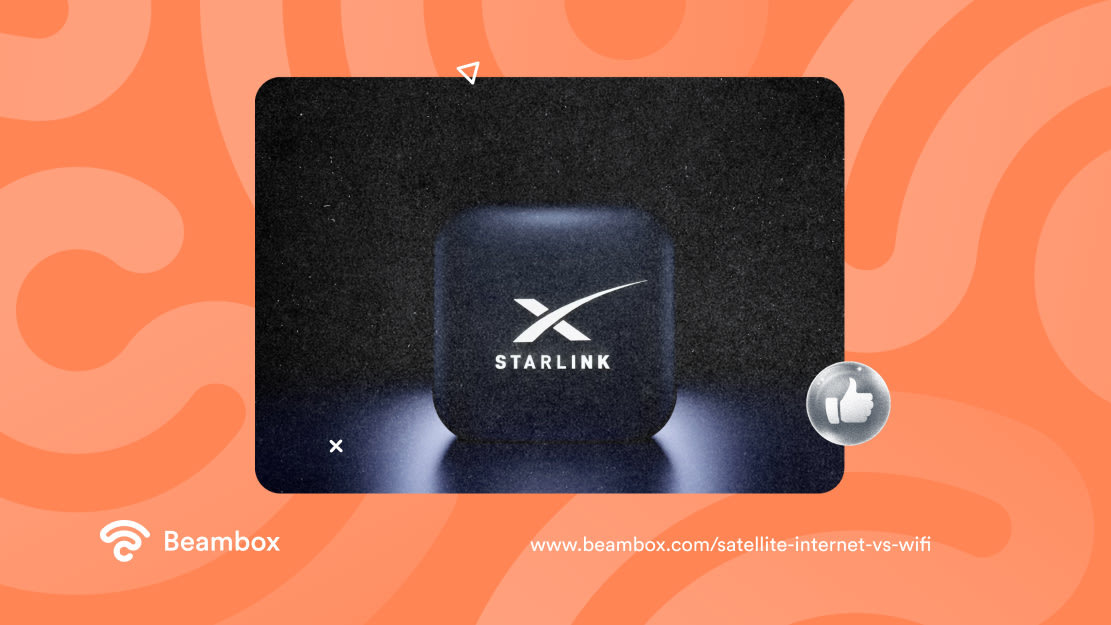Satellite Internet vs WiFi: Differences To Know
Choosing the right internet system is what makes the internet experience frustrating or smooth. This article explores the key differences between satellite internet vs WiFi.
You will understand their unique features, so you’ll be able to make an informed decision for your needs. Let’s see how it works!

Satellite Internet vs WiFi: Defining the Two
Let’s start by defining satellite vs. Wifi internet systems:
- Satellite Internet: It uses satellites orbiting the Earth to provide internet access. It works by sending data from your computer to a satellite, which then communicates with a ground station to access the internet. The main feature of satellite internet is wide coverage, especially in remote areas. However, it can experience higher latency and slower speeds compared to other types of internet connections.
- WiFi: WiFi stands for Wireless Fidelity. It is a technology that allows devices to connect to the internet wirelessly within a specific range. WiFi relies on a local router connected to an internet source, like Ethernet or DSL. Its main features are convenience, fast speeds within the coverage area, and ease of use for multiple devices. However, its range depends on the quality of the local internet connection.
As we have defined the two, let’s now investigate the existing differences between satellite internet vs WiFi hotspots.

Satellite Internet vs WiFi: General Differences
There are many differences that make these internet systems suitable for different use cases. The differences stem from the technologies involved.
As mentioned, Satellite internet uses satellites in orbit to provide internet access. Wi-Fi instead uses radio waves to create a local wireless network. This affects the workings of the internet and its best applications.
Let’s have a look at the main differences:
- Coverage: Satellite offers broad coverage and is especially useful in remote or rural areas where other internet services are unavailable. WiFi coverage depends on the range of the router, typically within a building or a nearby outdoor area.
- Speed: A satellite internet service can offer great speeds, but they are generally lower than those provided by wired connections. WiFi can also offer high speeds, but these depend on the wireless internet provider and the router’s capabilities. Contrary to common knowledge, performance does not depend on nearby cell towers.
- Latency: Satellite service typically has higher latency, depending on the longer or shorter distance data must travel. WiFi generally has lower latency, as it only involves local wireless transmission and a wired connection to the Internet.
- Installation and equipment: Satellite internet requires a satellite dish, modem, and sometimes professional installation. Setting up a WiFi requires a wireless router and a modem. Anyone can install and set up WiFi and enjoy the performance related to the wireless signal.

Satellite Internet Upload vs WiFi
Satellite Internet upload vs WiFi is another relevant difference to know and consider when making a choice.
Satellite internet generally has slower upload speeds compared to WiFi. This difference is due to the underlying technologies and infrastructure involved.
As data must travel to and from a satellite orbiting the Earth, upload speeds are typically slower than those of WiFi. Typical upload speeds for satellite internet range from 1 to 3 Mbps.
However, there are exceptions. For example, Starlink promises between 5 and 20 Mbps.
Usually, satellite connections are enough for most tasks. However, it can be insufficient for activities requiring higher bandwidth, such as video conferencing or uploading large files.
WiFi provides much faster upload speeds because it uses WiFi routers connected to wired broadband services. Wired connections offer higher bandwidth and lower latency.
For instance, cable or fiber internet services can provide upload speeds ranging from 10 to 50 Mbps. This depends on the user’s plan and chosen provider. This makes WiFi more suitable for data-intensive tasks, such as live streaming or online gaming.

Satellite Internet Data Limits
When choosing a satellite internet provider, it is fundamental to be aware of the data limits. These are restrictions on the amount of data you can use each month.
Satellite internet data limits are necessary because providers have to manage the bandwidth available from their satellites.
Internet plans typically vary from provider to provider, and the more data you want, the more expensive the subscription. Once you reach your data limit, your internet speed may significantly reduce. Alternatively, you may incur additional charges for extra data usage.
Data limits are typically larger with WiFi. Wireless providers in this space usually offer much higher data limits or even unlimited data. Wired connections have greater bandwidth capacity, allowing providers to offer more generous data plans.
How To Pick the Best Internet System for You
To choose the best internet system, consider the following factors:
- Availability: Check which services are available in your area. Satellite internet is good for remote locations, while WiFi through cable or fiber is best for urban and suburban areas.
- Speed: Determine the required speed for your activities. WiFi generally offers higher speeds suitable for streaming, gaming, and large downloads.
- Latency: If you need real-time interaction for gaming or video calls, WiFi with lower latency is preferable. Satellites have higher latency due to the long distances over which data travels.
- Data limits: Assess your data usage. WiFi with higher or unlimited data plans is ideal for high data consumption, such as streaming and large uploads. Satellite packages often have stricter data caps.
- Reliability: Satellite performance can degrade with bad weather conditions, while WiFi depends on the stability of the wired infrastructure. This is a crucial consideration when it comes to WiFi vs satellite internet.
- Cost: Consider the costs of installation, equipment, and monthly fees. Satellite internet may have higher installation costs, but it can be the only real solution. WiFi plans can vary widely based on speed, provider, and data limits.
Leveraging Your Internet Connection
At this point, you know how to choose between satellite internet vs WiFi. Consider your needs and circumstances, and your internet experience will be smooth. If you offer WiFi in your business, consider leveraging that free connection.
Beambox is a WiFi marketing solution that helps you transform your guest’s WiFi into a powerful marketing tool. With our all-in-one platform, you can enhance customer experience, gain valuable insights, and drive engagement.
Try Beambox for free today. No setup costs; cancel anytime!



